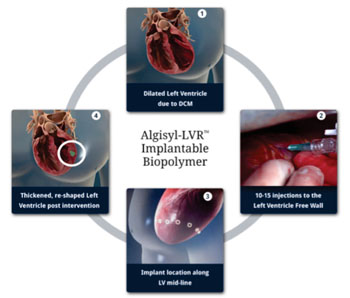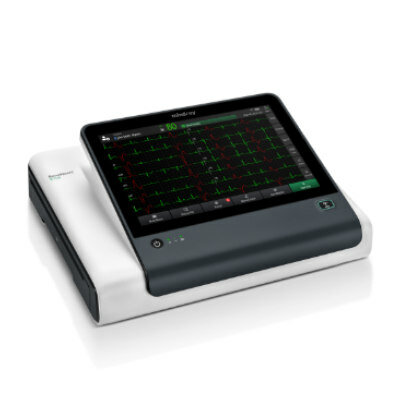Hydrogel Implant Helps Increase Cardiac Output 
|
By HospiMedica International staff writers Posted on 15 Oct 2014 |

Image: The Algisyl-LVR hydrogel implant procedure (Photo courtesy of LoneStar Heart).
An implantable hydrogel may revolutionize the treatment of heart failure (HF) in people with an enlarged left ventricle who lose the ability to pump blood efficiently.
The Algisyl-LVR implant is an injectable proprietary biopolymer intended to reverse HF progression by decreasing cardiac wall tension and improving heart muscle contractility and oxygen uptake, thus leading to a decrease in ventricle stress and to cardiomechanical improvement. Administered directly into strategic areas of the left ventricle muscle in 12–18 injections, the hydrogel thickens to form viscous bodies of polymer that remain in the muscle as permanent implants, reducing ventricular wall stress, increase pumping efficiency, and mitigating further dilation and negative remodeling of the left ventricle.
Two versions are being developed; a surgical product version intended for cardiothoracic surgeons, which is delivered in a standard syringe and custom needle system for performing the injections either during open chest surgery (in combination with other interventions such as bypass or valve repair), or through a stand-alone mini-thoracotomy operation. The second product delivery method offers a minimally invasive, catheter-based procedure that can be performed by interventional cardiologists or other specialists in a standard or hybrid cardiology laboratory.
The treatment does not interfere with drug therapies and the regular management of HF patients, since it consists of a one-time passive procedure. Once injected directly into the heart muscle, the hydrogel acts immediately as an internal scaffold that does not undergo long-term degradation. A randomized clinical trial (the AUGMENT-HF study) is underway in 14 centers worldwide to determine superiority to standard medical therapy. The Algisyl-LVR Hydrogel Implant is a product of LoneStar Heart (Laguna Hills, CA, USA), and has received the European Community CE marking of approval.
“Patients may soon have a revolutionary treatment to reduce the symptoms of moderate to severe heart failure and provide improvement in their clinical status and quality of life,” said Frank Ahmann, president and CEO of LoneStar Heart. “Our safety and efficacy results are consistently trending in the right direction, and we are looking forward to presenting the results of our AUGMENT-HF randomized clinical trial of Algisyl-LVR at the upcoming AHA meeting.”
Advanced HF represents a significant and growing epidemic healthcare burden in all developed countries, affecting patients whose heart muscle is initially damaged by infarcts, hypertension, valve disease, or other processes. To overcome the initial damage, the heart muscle works under increased stress without an opportunity to recover; eventually, the muscle of the left ventricle begins to stretch and the muscle cells lose the ability to contract normally. The therapeutic options for many of these patients who do not respond to drug and device therapies are limited and can be extremely complex and costly.
Related Links:
LoneStar Heart
The Algisyl-LVR implant is an injectable proprietary biopolymer intended to reverse HF progression by decreasing cardiac wall tension and improving heart muscle contractility and oxygen uptake, thus leading to a decrease in ventricle stress and to cardiomechanical improvement. Administered directly into strategic areas of the left ventricle muscle in 12–18 injections, the hydrogel thickens to form viscous bodies of polymer that remain in the muscle as permanent implants, reducing ventricular wall stress, increase pumping efficiency, and mitigating further dilation and negative remodeling of the left ventricle.
Two versions are being developed; a surgical product version intended for cardiothoracic surgeons, which is delivered in a standard syringe and custom needle system for performing the injections either during open chest surgery (in combination with other interventions such as bypass or valve repair), or through a stand-alone mini-thoracotomy operation. The second product delivery method offers a minimally invasive, catheter-based procedure that can be performed by interventional cardiologists or other specialists in a standard or hybrid cardiology laboratory.
The treatment does not interfere with drug therapies and the regular management of HF patients, since it consists of a one-time passive procedure. Once injected directly into the heart muscle, the hydrogel acts immediately as an internal scaffold that does not undergo long-term degradation. A randomized clinical trial (the AUGMENT-HF study) is underway in 14 centers worldwide to determine superiority to standard medical therapy. The Algisyl-LVR Hydrogel Implant is a product of LoneStar Heart (Laguna Hills, CA, USA), and has received the European Community CE marking of approval.
“Patients may soon have a revolutionary treatment to reduce the symptoms of moderate to severe heart failure and provide improvement in their clinical status and quality of life,” said Frank Ahmann, president and CEO of LoneStar Heart. “Our safety and efficacy results are consistently trending in the right direction, and we are looking forward to presenting the results of our AUGMENT-HF randomized clinical trial of Algisyl-LVR at the upcoming AHA meeting.”
Advanced HF represents a significant and growing epidemic healthcare burden in all developed countries, affecting patients whose heart muscle is initially damaged by infarcts, hypertension, valve disease, or other processes. To overcome the initial damage, the heart muscle works under increased stress without an opportunity to recover; eventually, the muscle of the left ventricle begins to stretch and the muscle cells lose the ability to contract normally. The therapeutic options for many of these patients who do not respond to drug and device therapies are limited and can be extremely complex and costly.
Related Links:
LoneStar Heart
Latest Critical Care News
- New Approach to Visualizing Blood Pressure Data Can Help Better Manage Hypertension Patients
- Breakthrough AI Technology Accurately Assesses Heart Failure Severity
- Smart Bandage Monitors Chronic Wounds in Human Patients
- AI Identifies Patients with Increased Lung Cancer Risk Up To 4 Months Earlier
- Next Gen Hemodynamic Monitoring Solution Provides AI-Driven Clinical Decision Support
- AI Algorithm Identifies High-Risk Heart Patients
- Wearable Glucose Monitor Offers Less Invasive Approach to Assessing Diabetes Risk
- Wireless, Self-Powered Smart Insole to Improve Personal Health Monitoring
- Novel Cannula Delivery System Enables Targeted Delivery of Imaging Agents and Drugs
- Ingestible Smart Capsule for Chemical Sensing in the Gut Moves Closer to Market
- Novel Intrabronchial Method Delivers Cell Therapies in Critically Ill Patients on External Lung Support
- Generative AI Technology Detects Heart Disease Earlier Than Conventional Methods
- Wearable Technology Predicts Cardiovascular Risk by Continuously Monitoring Heart Rate Recovery
- Wearable Health Monitoring Device Measures Gases Emitted from and Absorbed by Skin
- Groundbreaking Technology Rapidly Detects Airborne Influenza Viruses
- Handheld Device Could Transform Heart Disease Screening
Channels
Surgical Techniques
view channel
DNA Origami Improves Imaging of Dense Pancreatic Tissue for Cancer Detection and Treatment
One of the challenges of fighting pancreatic cancer is finding ways to penetrate the organ’s dense tissue to define the margins between malignant and normal tissue. Now, a new study uses DNA origami structures... Read more
Pioneering Sutureless Coronary Bypass Technology to Eliminate Open-Chest Procedures
In patients with coronary artery disease, certain blood vessels may be narrowed or blocked, requiring a stent or a bypass (also known as diversion) to restore blood flow to the heart. Bypass surgeries... Read more
Intravascular Imaging for Guiding Stent Implantation Ensures Safer Stenting Procedures
Patients diagnosed with coronary artery disease, which is caused by plaque accumulation within the arteries leading to chest pain, shortness of breath, and potential heart attacks, frequently undergo percutaneous... Read more
World's First AI Surgical Guidance Platform Allows Surgeons to Measure Success in Real-Time
Surgeons have always faced challenges in measuring their progress toward surgical goals during procedures. Traditionally, obtaining measurements required stepping out of the sterile environment to perform... Read morePatient Care
view channel
Portable Biosensor Platform to Reduce Hospital-Acquired Infections
Approximately 4 million patients in the European Union acquire healthcare-associated infections (HAIs) or nosocomial infections each year, with around 37,000 deaths directly resulting from these infections,... Read moreFirst-Of-Its-Kind Portable Germicidal Light Technology Disinfects High-Touch Clinical Surfaces in Seconds
Reducing healthcare-acquired infections (HAIs) remains a pressing issue within global healthcare systems. In the United States alone, 1.7 million patients contract HAIs annually, leading to approximately... Read more
Surgical Capacity Optimization Solution Helps Hospitals Boost OR Utilization
An innovative solution has the capability to transform surgical capacity utilization by targeting the root cause of surgical block time inefficiencies. Fujitsu Limited’s (Tokyo, Japan) Surgical Capacity... Read more
Game-Changing Innovation in Surgical Instrument Sterilization Significantly Improves OR Throughput
A groundbreaking innovation enables hospitals to significantly improve instrument processing time and throughput in operating rooms (ORs) and sterile processing departments. Turbett Surgical, Inc.... Read moreHealth IT
view channel
Printable Molecule-Selective Nanoparticles Enable Mass Production of Wearable Biosensors
The future of medicine is likely to focus on the personalization of healthcare—understanding exactly what an individual requires and delivering the appropriate combination of nutrients, metabolites, and... Read more
Smartwatches Could Detect Congestive Heart Failure
Diagnosing congestive heart failure (CHF) typically requires expensive and time-consuming imaging techniques like echocardiography, also known as cardiac ultrasound. Previously, detecting CHF by analyzing... Read moreBusiness
view channel
Expanded Collaboration to Transform OR Technology Through AI and Automation
The expansion of an existing collaboration between three leading companies aims to develop artificial intelligence (AI)-driven solutions for smart operating rooms with sophisticated monitoring and automation.... Read more















